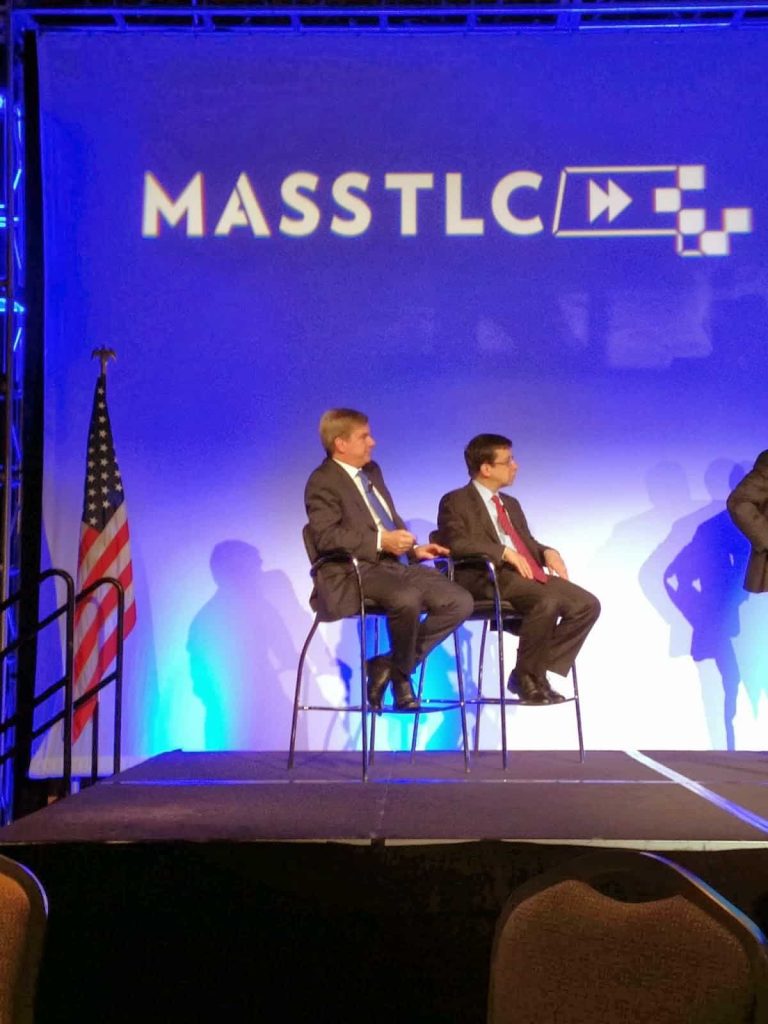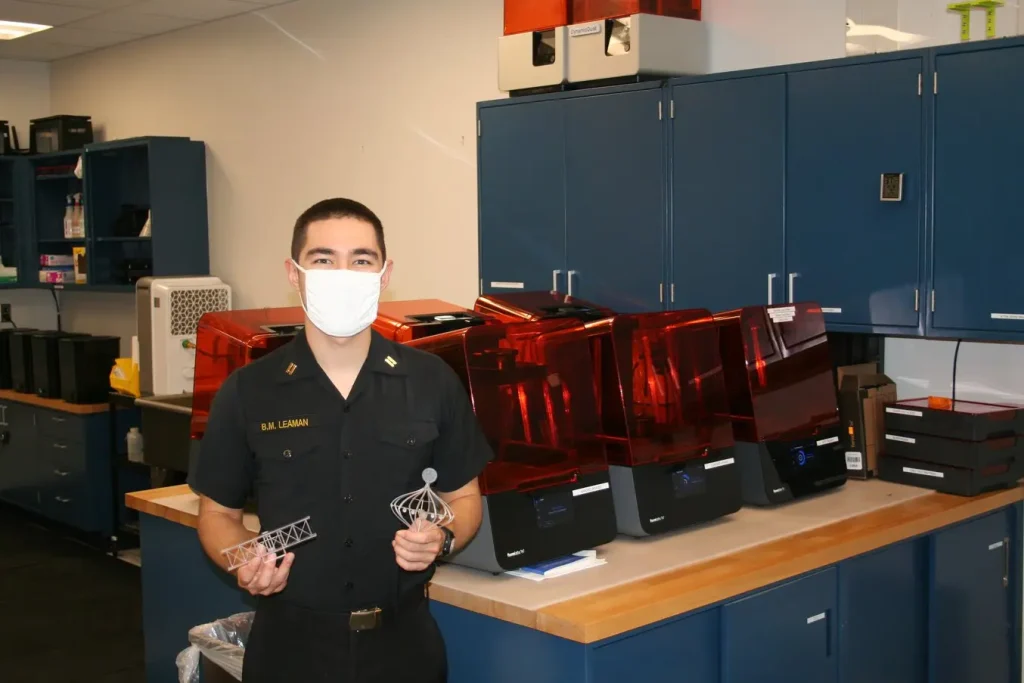Where does technology stand in Massachusetts and how does it compare with other states? What impact does technology in the Commonwealth have on the overall job market, wages and the growth of the Massachusetts economy? And how can Massachusetts continue to propel growth in the Tech Sector? These are just some of the questions discussed at The Massachusetts Technology Leadership Council’s (MassTLC) Annual Meeting, held on Thursday, February 13th, at the Renaissance Boston Waterfront Hotel in Boston.
Despite upwards of eight inches of new, wet snow falling on the Boston region, several hundred registrants attended to hear the perspectives of the meeting’s renowned list of speakers, including: Dr. Michael Mandel, Chief Economic Strategist of Progressive Policy Institute and Greg Bialecki, Massachusetts Secretary of Housing & Economic Development. While originally scheduled to speak, the weather unfortunately prevented Michael Beckerman, President & CEO of the Internet Association from attending the event.
MassTLC President & CEO Tom Hopcroft kicked-off the meeting by presenting attendees with a summary of MassTLC’s 2014 State of Technology report, which benchmarks the tech sector’s impact on the Massachusetts economy. Using data compiled by researchers at the University of Massachusetts’ Donahue Institute between October 2013 and January 2014, the report reveals that the tech sector is a significant driver of jobs, wages, and tax revenues in the Commonwealth, with the sector underpinning $156 billion in economic output.
In 2010, the Council challenged its members and the Commonwealth to build on Massachusetts’ technology legacy and realize the potential for new jobs and tech innovation. This 2020 Challenge set as a goal the creation of 100,000 new technology jobs by the end of the decade – a development that, if realized, would have a tremendous impact not only for the state and its residents, but for those who benefit from the technology created and applied here.MassTLC’s 2014 State of Technology report reflects on these goals.
Highlighting the positive trajectory of growth that the Commonwealth’s tech sector currently offers, the report also emphasizes the importance of collaboration between policy-makers and the private industry to address fundamental issues that impact the tech sector in Massachusetts, such as:
- Talent retention and workforce development
- Access to capital, infrastructure and transportation improvements
- Costs and policies that impact the Commonwealth’s impact on the global economy
Some of the key findings of the report include:
- The tech sector is the biggest innovation sector.
- 13,500 companies or 6.0% of all companies in the state
- 209,000 or 6.5% of workforce
- Tech has impact across the entire economy.
- With jobs multiplier of 2.95%, tech underpins
- 620,000 jobs, almost one-fifth (19.1%) of the MA workforce
- $50.6 billion, over one-quarter of payroll in MA
- $6.8 billion in state and local taxes
- $156 billion in economic output
- Tech jobs in MA pay a competitive $116,000 average annual wage; the third highest among leading tech states
- Tech has been growing and executives anticipate further growth.
- From 2009-2012, tech has added
- 1,746 companies an increase of 14.9%
- 11,099 jobs (from 198,062 to 209,161), an increase of 5.6%
- Outpacing CA (4.9%) and U.S. (4.0%) tech sectors; and well above the state average of 3.4%
- 81% of MA tech execs anticipate hiring for newly created positions in 2014 (compared with 63% nationally)
“The history of technology in Massachusetts has been well chronicled. But what is happening around technology in Massachusetts today – and what the future promises – is far more exciting,” said Hopcroft. “The findings in this year’s report show that we’re nearly on track with our 2020 Challenge. I remain optimistic that if we engage in a thoughtful and deliberate dialogue with policy-makers on these and other key issues, we can better promote the growth and reach of the Commonwealth’s Tech Sector in 2014 and beyond.”
[Note: A full version of MassTLC’s 2014 State of Technology report can be downloaded here.]Boston Mayor Marty Walsh, who attended the meeting to hear the findings of the new report, reiterated the progress presented by Hopcroft, stating that while Massachusetts has seen great progress, the Commonwealth still has a way to go in terms of partnering tech companies with other industries to further improve the tech scene in Massachusetts.
 “I want Boston to become the technology capital of the world,” said Walsh. Audience members applauded Walsh upon hearing of his administration’s plans to further improve broadband in the Boston area and his plans to work with partners in Washington to keep the Internet industry neutral.
“I want Boston to become the technology capital of the world,” said Walsh. Audience members applauded Walsh upon hearing of his administration’s plans to further improve broadband in the Boston area and his plans to work with partners in Washington to keep the Internet industry neutral.
Speaking from his research on the economic growth of technology in the Boston as well as other cities, including New York and San Francisco, Dr. Michael Mandel then took to the stage to discuss the need to leverage education to foster economic growth in the Commonwealth. Mandel’s research showed that while the job market for tech-based jobs has continued to grow at a steady pace in Massachusetts, the number of college students graduating with computer and information science degrees has seen a sharp decline since 2004. “We are in the midst of a tech boom and we need to start seeing a closer merger of supply and demand between the job market and the degrees that students are receiving,” said Mandel.
Using the new 94Fifty basketball as an example, Mandel reminded attendees of the ripple effects that technology has on a growing swath of industries and applications…from retail and payroll to healthcare, exercise, home security and the automobile industry. “More innovation creates more jobs,” said Mandel, while also suggesting that to grow the sector intelligently, a path of ‘rational exuberance’ should be considered.
Greg Bialecki reinforced Mandel’s statement about the effects of technology on so many other industries. “Innovation is not just about software, he said. “Revolutionary changes are happening in many industries as a result of the Internet.” Bialecki then went on to discuss the emergence of the region’s Innovation Centers in Cambridge and Boston, noting that he and Governor Deval Patrick would like to see the expansion of Innovation Centers in other areas of Massachusetts as well.
“We should aim for doubling the size of our innovation economy over the next decade,” said Bialecki. To succeed at doing this, Bialecki proposed more housing and better infrastructure; better workforce laws and policies to support growth; a tech industry that is civically engaged; and self-confidence in what we can achieve.
Tim Rowe, Founder & CEO of the Cambridge Innovation Center concluded the breakfast meeting by moderating an open forum discussion in which Bialecki and Mandel were joined onstage by a panel of Massachusetts tech sector leaders including: Meredith Flynn-Riply, CEO of HeyWire; Cathy Wissink Director, Technology Community Engagement of Microsoft; Anthony Longo, Co-Founder & CEO of CO Everywhere; Cory Von Wallenstein, CTO of Dyn.com; and James Geshwiler, Managing Director of CommonAngels. These tech leaders provided feedback on the day’s presentations and shared some of their own ideas on how further improvements could be made in the Massachusetts tech sector. Some of the discussions from this panel included:
- Whether it was more of a challenge to create more tech jobs or to increase the number of college students majoring in tech-related fields;
- Pros and cons of ‘workforce suburbanization,’ given that technology advances now allow for a more distributed workforce
- How to attract more tech media to Massachusetts
While the Commonwealth has made great strides in rebuilding the Commonwealth’s position as one of the nation’s leading tech hubs, more needs to be accomplished to help us meet the goals of the 2020 Challenge. To ensure continued job growth in the tech sector, policy-makers and the tech industry must work collaboratively to address talent retention and workforce development; access to capital; infrastructure and transportation improvements; and costs and policies that impact our competitiveness in the global economy. Over the coming year, we look forward to seeing the progress that the Commonwealth’s tech community and policy makers achieve in turning Massachusetts into the pride of the nation for tech innovation.
For a complimentary copy of the report, MassTLC’s 2014 State of Technology: Benchmarking the Tech Sector’s Impact On the Massachusetts Economy, please visit: https://www.mtlc.co/?page=2014StateofTech





